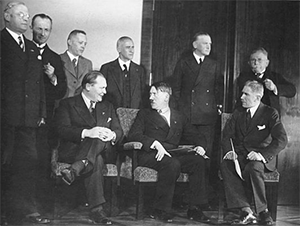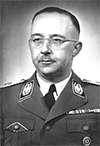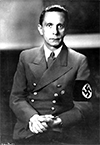 The head of state of Nazi Germany was Chancellor Adolf Hitler, who had assumed total control of the lawmaking power by virtue of the Enabling Act of 1933 and who later outlawed all political parties except for the Nazi Party. He was not the entire government, however. Running the various Cabinet-equivalent ministries were Reichsministers.
The head of state of Nazi Germany was Chancellor Adolf Hitler, who had assumed total control of the lawmaking power by virtue of the Enabling Act of 1933 and who later outlawed all political parties except for the Nazi Party. He was not the entire government, however. Running the various Cabinet-equivalent ministries were Reichsministers.
When Hitler became Chancellor, in January 1933, the head of state was the President, who had a Cabinet consisting of the Chancellor, Vice-Chancellor, and 10 Reichsministers. The President at that time was Paul von Hindenburg. Former Chancellor Franz von Papen served as Vice-chancellor. The Reichsministers were these:
- Foreign Affairs: Konstantin von Neurath
- Interior: Wilhelm Frick
- Finance: Lutz Graf Schwerin von Krosigk
- Justice: Franz Gürtner
- Reichswehr: Werner von Blomberg
- Economics: Alfred Hugenberg
- Food and Agriculture: Alfred Hugenberg
- Labor: Franz Seldte
- Postal: Paul Freiherr von Eltz-Rübenach
- Transport: Paul Freiherr von Eltz-Rübenach.
Of those, most were not members of the Nazi Party. Gürtner, Hugenberg, and Seldte were with the German National People's Party, and Blomberg, Eltz-Rübenach, Krosigk, Neurath, and Papen were independent. That changed within a year. The government dissolved the German National People's Party in June; Hugenberg left the Cabinet, Gürtner stayed on without party affiliation, and Seldte was all set, having joined the Nazi Party in April. Replacing Hugenberg in Economics was Kurt Schmitt; Richard Walther Darrê took over Food and Agriculture. After that, Cabinet membership stayed the same for a number of years.
The government eliminated the position of Vice-chancellor on Aug. 7, 1934. Papen was thus out of a job; he later served as an ambassador. In his place was Deputy Führer Rudolf Hess, who had begun in that capacity in December 1933.
The Economics portfolio went through five Reichsministers in all, Hjalmar Schacht replacing Schmitt in August 1934, Hermann Göring replacing Schacht in November 1937 (after Schacht left to head up the Reichsbank), and Walther Funk taking over in February 1938. Other ministries with multiple ministers during the war were these:
- Joachim von Ribbentrop replaced Neurath atop Foreign Affairs in February 1938, Neurath leaving to become Reich Protector of Bohemia-Moravia).
 Heinrich Himmler (right) took over the running of Interior in August 1943 (Frick having succeeded Neurath as Reich Protector of Bohemia-Moravia).
Heinrich Himmler (right) took over the running of Interior in August 1943 (Frick having succeeded Neurath as Reich Protector of Bohemia-Moravia).- Franz Schlegelberger began heading up Justice in January 1941 and gave way to Otto Georg Thierack in August 1942.
- Herbert Backe took over for Darrê at Food and Agriculture in April 1944.
- Eltz-Rübenach resigned from the Cabinet in February 1937, replaced at Transport by Julius Dorpmüller and as Postal Minister by Weilhelm Ohnesorge.
Hitler and the government expanded the Cabinet as well, adding new positions and giving some people Cabinet-level authority without a portfolio:
 Heading up the new Ministry of Public Enlightenment and Propaganda was Joseph Goebbels (right), beginning in March 1933.
Heading up the new Ministry of Public Enlightenment and Propaganda was Joseph Goebbels (right), beginning in March 1933.- Overseeing the Ministry of Science, Education and Culture, starting in May 1934, was Bernhard Rust.
- Overseeing the country's Aviation Ministry from May 1933 was Hermann Göring.
- In the same vein, Fritz Todt (March 1940) and then Albert Speer (November 1941) ran Armaments and Munitions.
Lastly, a number of high-ranking officials had the rank and authority of a member of the Cabinet but did not have the title of Reichsminister:
- Wilhelm Keitel, Chief of the Armed Forces High Command
- Army Commander-in-Chief Werner von Fristch (1936–1938) and Walther von Brauchitsch (1938–1941).
- Navy Commander-in-Chief Erich Raeder (1936–1943) and Karl Dönitz (1943–1945)
- Martin Bormann, Chief of the Party Chancellery.
The last meeting of the full Cabinet took place on Feb. 5, 1938. As the years passed and the war progressed, the government operated more and more by decree.



 The head of state of Nazi Germany was Chancellor
The head of state of Nazi Germany was Chancellor  Heinrich Himmler (right) took over the running of Interior in August 1943 (Frick having succeeded Neurath as Reich Protector of Bohemia-Moravia).
Heinrich Himmler (right) took over the running of Interior in August 1943 (Frick having succeeded Neurath as Reich Protector of Bohemia-Moravia). Heading up the new Ministry of Public Enlightenment and Propaganda was Joseph Goebbels (right), beginning in March 1933.
Heading up the new Ministry of Public Enlightenment and Propaganda was Joseph Goebbels (right), beginning in March 1933.
